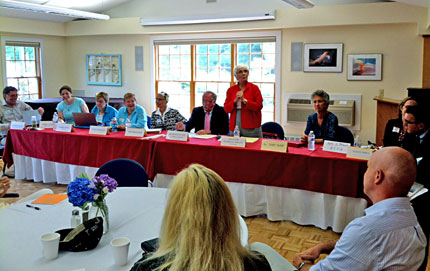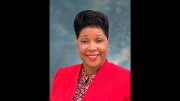By: Lauren Walleser/TRT Assistant Editor—
The Massachusetts Commission on LGBT Aging is hosting four historic listening sessions throughout the state, all with the goal of investigating, analyzing and studying health, housing and social connections for LGBT older adults and their caregivers. The information they receive will be used to make recommendations to improve access to benefits and services for LGBT elders.
“LGBT older adults and caregivers have been an invisible subgroup within two populations: older adults invisible within the LGBT community, and LGBTs invisible within the older adult population,” said Lisa Krinsky, director of the LGBT Aging Project, a program of Fenway Health. “We want to ensure that this invisible yet growing group is not overlooked, that their needs as LGBT folks and as older adults are well met so that they can grow old with the dignity and respect they deserve.” [pullquote]“LGBT older adults and caregivers have been an invisible subgroup within two populations: older adults invisible within the LGBT community, and LGBTs invisible within the older adult population,” said Lisa Krinsky, director of the LGBT Aging Project, a program of Fenway Health. [/pullquote]
The Commission—the first statewide commission in the country of its kind—seeks a diverse group of LGBT older adults, family, friends, and allies to speak at the hearings. According to Sen. Patricia D. Jehlen and Rep. James O’Day, co-chairs of the Joint Committee on Elder Affairs, the first session, held at the MA State House June 17, was attended by 35-40 attendees. The second session, held in Cape Cod at the Orleans Council on Aging July 21, was attended by 75 people. Approximately 45 individuals spoke between the two sessions.
“A common concern from the first listening session was about housing that is safe, not to mention affordable, in the Boston area for members of the LGBT community,” Jehlen and O’Day said. “Many members felt that they have spent 20 plus years as an open gay, lesbian or bisexual individual and when they retire they should not have to go back ‘into the closet’ to protect themselves from other residents.”
Another concern brought up at the second session was the ability to connect socially with other LGBT people in the surrounding areas, as well as finding primary care doctors.
“In general, there are not enough doctors on the Cape for everyone and, in particular, for an LGBT member to find one that is approachable,” said Jehlen and O’Day. “A common theme in both sessions was the need for more awareness and [cultural competency/sensitivity] training of both public and private service providers.”
Another question posed at both sessions was whether “LGBT only” versus “integrated housing,” services, or social programming were more appropriate or effective. [pullquote]Another question posed at both sessions was whether “LGBT only” versus “integrated housing,” services, or social programming were more appropriate or effective.[/pullquote]
“Without passing judgment, consensus seemed to point to ensuring an array of options in as many communities as possible,” the co-chairs said.
Krinsky shared some other learnings from the two sessions.
“Many LGBT older adults are dealing with general issues that face older adults—healthcare costs and access—while also those issues unique to LGBT older adults—safe and welcoming housing, remaining connected to LGBT peers and community, discrimination and disrespect from others,” said Krinsky. “Folks in the Boston area also acknowledged their appreciation for the programming that is inclusive for LGBT older adults and how that is of great value to them.”
Two more sessions are scheduled for September 15 at 4 p.m. at Quinsigamond Community College in Worcester and September 22 at 3 p.m. at Holyoke Community College in Holyoke. According to Jehlen and O’Day, the Commission will then continue to use the information learned to make recommendations to the legislature, state administration, and/or others for further action in a report due to be published in Spring 2015.
“In a general sense, the population as a whole is becoming older,” Jehlen and O’Day said. “In the 21st century, people are more open to expressing their true sexual orientation and gender identity as well as communities accepting of people of all different races, cultures and sexual orientations and gender identities. Yet, the older LGBT population is faced with some unique aspects to their aging, such as lacking wider family/social networks that often provide caregiving and other support, as well as the possibility of facing discrimination still by those who have yet to fully embrace the concept of equality based on sexual expression.” [pullquote]”…Yet, the older LGBT population is faced with some unique aspects to their aging, such as lacking wider family/social networks that often provide caregiving and other support, as well as the possibility of facing discrimination still by those who have yet to fully embrace the concept of equality based on sexual expression.”— Jehlen and O’Day[/pullquote]
The members of the Massachusetts Commission on LGBT Aging, in addition to O’Day, Jehlen and Krinsky, include the secretary of Elder Affairs, the director of the Office of Housing & Community Development, the commissioner of Public Health, the president of Fenway Health, the executive director of Gay & Lesbian Advocates & Defenders, the National Association on HIV Over Fifty, Inc., the deputy director of MassEquality, the executive director of Mass Home Care, director of AARP MA, the executive director of MA Councils on Aging, director of Mass Senior Care (formerly Mass Extended Care Association), director of MA Council for Home Care Aide Services, and the governor’s appointees, including an LGBT public policy expert, LGBT elder law expert, an LGBT older adult who is transgender, and LGBT older adults from Cape Cod and Western Mass.
For anyone who is unable to attend the sessions or is more comfortable submitting comments in writing, they may send them to the Joint Committee on Elder Affairs, Room 167, State House, Boston, MA, 02133 or to MALGBTAgingCommission@gmail.com.








